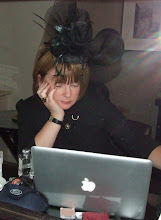Razzle-dazzle ‘em….
It is a demonstration of how far I’ve travelled in the last
four years that my instant reaction to an article on academic writing is to
write. Not a complete rebuttal, because as a designer, I don’t really come from
that world, but have been required to inhabit the periphery at least. I have to
confess I quite like it there. As an
architect, drawing - our tool for expression- has a specific purpose, which is to
communicate, whether that involves the communication of a concept, a model of a complete building, or technical and construction
information. If you fail to communicate with drawing as an architect, you’re on
a hiding to nowhere. Being obliged to write an entire PhD has transformed this
architect into a writer, and initially an extremely reluctant one, through painful adaptation, to the
point that nowadays, some of you have to endure my latent hypergraphia
(pedantic joke warning) on a regular basis. I write things down in order to better
understand them, and that applies as much to my academic writing as to anything
else. If I ever manage to make any sense of the last ten years or so of my
life, there’s at least a novel in it. To those of you who would wish to write
me into a novel: best get to know the story first. People’s stories are seldom
what you imagine them to be, though that is half the fun in writing fiction. I
suppose it rather depends on whether the intention is Tolstoy or Jilly Cooper.
Please not Anita Brookner, for I would sooner die.
As an academic writer, I write from a position where my
research is genuinely interdisciplinary, so that clarity and communication are
critical to the reader. As a reader, I abhor the sort of academic writing which
is wordy, self-consciously pedantic, designed (using the word very loosely, and
largely incorrectly) to appeal to a very small group of people. In some disciplines, it is close to inevitable. I’m perhaps
lucky then, that mine is design research. As it synthesises theory from a
number of disciplines - environmental psychology, neuroscience, ICT, in
addition to colour and aesthetic theory, I have had very little choice but to
aim for clarity in order firstly, to draw out ideas, and secondly, to
communicate. One of my examiners is an architect; the other researches systems
optimization. If MyRoom ever becomes a reality, there will be collaboration
from Applied Psychology, nano-technology, digital media, computer science,
engineering….I can’t afford not to be understood. Often when I read guidelines
on paper submission, there is an explicit requirement for clarity of expression
for a readership from an acknowledged international and multidisciplinary audience.
That the research falls into the general area of ‘Smart Design’ may not be
coincidental. Perhaps there will be more of this as disciplines converge, and the
need to communicate to a greater audience becomes more pressing. I don’t believe
in using two words when one will do (unless it makes a sentence sing better),
or a long word where a shorter one will suffice, unless of course it’s an
aesthetically-pleasing long word. Perhaps I’m lucky in terms of where I landed
academically. It could have been specialisation which came with an automatic
requirement to murder the English language. But never make the mistake of
thinking that academic writing does not serve a purpose: if the spoken work is
powerful, and can bring an idea into being, the written word is ten times so.
As you write, and especially if you are required to write at some length, ideas
and conclusions emerge from what you are writing. Very rarely, and luckily, you read back,
and think ‘Did I really write that?’, because it has taken on a life of its own
while your attention was elsewhere.
I recently bought a copy of The Experience of God: Being, Consciousness, Bliss, written by Yale
academic David Bentley Hart. While one
might regard the topic as arcane or difficult to define, the writing is
beautiful; a model of simplicity and clarity. I’m also at one –well, mostly-
with George Orwell, writing in ‘Politics and the English Language’, and when I re-read
my thesis having read that essay (with thanks to a certain academic for
creating that last-minute panic; you know who you are), I found myself not so
bad, though with a slight tendency to overuse of reflexive verbs. Minimalism,
and the idea of elegance in design, are key concepts in my own thesis, so that
it would have been resoundingly inappropriate to aim at anything other than
clarity and simplicity. Sometimes “less is more”, and sometimes less is simply
less. So having been architecturally educated in the minimalist canon, perhaps
I was travelling from the other direction to begin with. Two roads converged in
a wood?
While the New Yorker article makes the point about the
necessity for academics to impress particular people, there is something a tiny
bit sad about writing that sets out to do that, because it inevitably suffers,
as a piece of writing, from the requirement to show off, which is a clear
incitement to pedantry, which should really be a criminal offence.
My best academic writing anecdote is from an
interdisciplinary ICT seminar where a young mathematician presented a paper on
the algorithms he was working on. The audience was almost entirely composed of quite
experienced academics. When he got the end, the chair, who was also the project
PI, stood up and said “Are there any questions?”There was a ripple of laughter.
“No? I didn’t think so’. Razzle dazzle ‘em…..

No comments:
Post a Comment